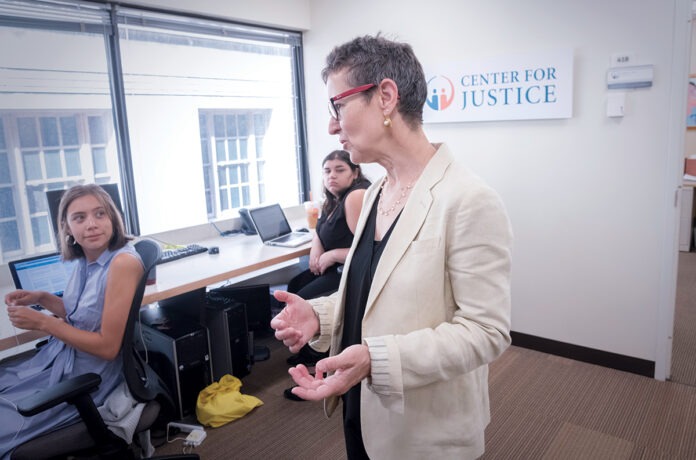
Jennifer Wood is the executive director of the Rhode Island Center for Justice, a part of a network of 80 agencies and social-service organizations that supports Homes RI. The coalition is hosted by the Housing Network of Rhode Island.
Wood spoke to the Providence Business News this week about steps being taken in the state to protect residential tenants from eviction, following the dramatic loss of jobs and personal income in the state as seen through the early weeks of the COVID-19 pandemic.
PBN: What is Homes RI?
WOOD: The coalition focuses on issues relating to housing and homelessness. But it’s comprised of organizations [such as] my own, the R.I. Center for Justice, which represents low-income tenants, but also community-development organizations, including agencies [such as] R.I. Housing, a state agency that has a lot of responsibility around housing creation. It’s a big-tent organization.
PBN: When this crisis hit, including the start of the layoffs in Rhode Island, in which about 25,000 people lost their job the first week alone, did Homes RI think then that the federal and state governments would step in to help protect tenants?
WOOD: That’s a hard question to answer because so much has happened. It’s been an itinerant process, in which the circumstances around us have changed so much on such a rapid basis. For the Homes RI coalition, it’s not just a question of hoping those responses would take place but also galvanizing support for actions that we think are necessary and important.
PBN: Of all the things at the state level that have happened to counter the COVID-19 impacts, including a temporary stay on evictions and a stop to utility cutoffs, what is the most important protection for tenants?
WOOD: It’s hard to single out a protection for people in a crisis of this sort. [There is the] housing domain, in terms of preventing and, at this time, delaying eviction, and making sure the utilities are in place and are not shut off. But also, on the other side of that coin is income protection. A loss of income is a direct causation to eviction. The steps to make unemployment insurance immediately available and to expand unemployment insurance to new categories of workers, self-employed individuals, are so critically important. Those income protections are critically important to keeping people in housing.
PBN: Do landlords act quickly here to evict tenants?
WOOD: Landlords are as diverse as homeowners and business owners. There is a wide array of practices. I will say the law permits relatively fast action, even when a single payment has been missed. Were it not for the fact the courts are closed for all but emergency activity, I think we would have a high volume of evictions taking place right now, just based on the fact that many people are living paycheck to paycheck. If you lose one paycheck, you can’t pay next month’s rent.
PBN: Are you hearing anecdotally how landlords are responding to the pandemic crisis?
WOOD: We have a dedicated voice mailbox at our center right now. It’s kind of a hotline for people to call in and get their questions answered. We’re receiving up to 10 to 15 calls a day who say they’ve lost their jobs and their landlord is threatening to kick them out. I don’t want to tar the situation with one brush. You wouldn’t call an office like ours if you’re not having a problem. I’m sure there are landlords working with their tenants, particularly if they’re long term and reliable.
Mary MacDonald is a staff writer for the PBN. Contact her at MacDonald@PBN.com.











